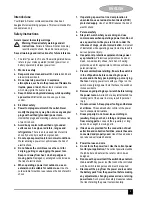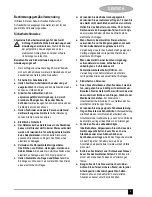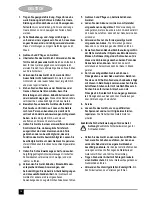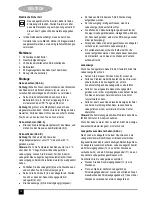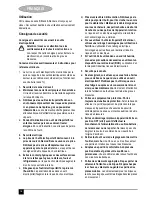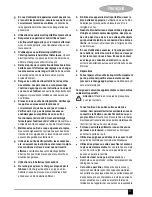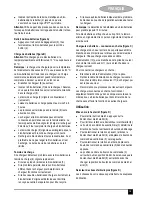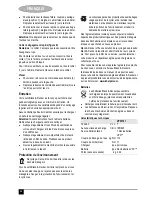
5
ENGLISH
When assessing vibration exposure to determine safety
measures required by 2002/44/EC to protect persons
regularly using power tools in employment, an estimation of
vibration exposure should consider, the actual conditions of
use and the way the tool is used, including taking account of
all parts of the operating cycle such as the times when the
tool is switched off and when it is running idle in addition to
the trigger time.
Labels on tools
Additional safety instructions for batteries and chargers
Batteries
X
Never attempt to open for any reason.
X
Do not expose the battery to water.
X
Do not expose the battery to heat.
X
Do not store in locations where the temperature may
exceed 40 °C.
X
Charge only at ambient temperatures between 10 °C
and 40 °C.
X
Charge only using the charger provided with the tool.
X
When disposing of batteries, follow the instructions
given in the section "Protecting the environment".
Chargers
X
Use your Black & Decker charger only to charge the
battery with which it was supplied. Other batteries could
burst, causing personal injury and damage.
X
Never attempt to charge non-rechargeable batteries.
X
Have defective cords replaced immediately.
X
Do not expose the charger to water.
X
Do not open the charger.
X
Do not probe the charger.
Electrical safety
This charger is double insulated; therefore no earth
wire is required. Always check that the power
supply corresponds to the voltage on the rating
plate.
X
If the supply cord is damaged, it must be replaced by the
manufacturer or an authorised Black & Decker Service
Centre in order to avoid a hazard.
Features
1. Quick release collar
2. Speed selector switch
3. Forward/reverse and lock-off button
4. Battery compartment
5. Battery release button (on battery)
6. On/off trigger switch
Assembly
Installing the battery pack (fig. A)
Warning!
Make sure that the lock-off button (3) is engaged
to prevent accidental switch actuation before removing or
installing a battery.
X
Insert the metal terminal end of the battery pack into the
battery compartment (4) until you hear the lock click into
place and the VPX™ logo shows through the window.
Warning!
The battery will only fit one way, do not force it. If
the battery does not fit, remove it and put it in the other way.
Removing the battery pack (fig A)
X
Press the battery pack release button (5) and firmly pull
the battery pack out of the battery compartment (4).
Charging the batteries (fig. B)
Warning!
Do not charge battery packs at ambient
temperatures below 10 °C or above 40 °C.
Note:
The charger will not charge a battery pack if the cell
temperature is below approximately 0 °C or above 60 °C.
The battery pack should be left in the charger and the
charger will begin to charge automatically when the cell
temperature warms up or cools down.
X
Plug in the charger (8) and switch on at the mains.
X
Insert the battery pack (7) into the charger. Make sure
that the battery pack is fully seated in the charger (8).
X
The charging indicator (9) will flash continuously
(slowly).
X
Leave the battery to charge for at least 5 to 6 hours.
X
The charge is complete when the charging indicator (9)
lights continuously
X
The charger and the battery pack can be left connected
indefinitely with the LED illuminated. The LED will
change to flashing (charging) state, as the charger
occasionally “tops off “ the battery charge.
Warning!
To reduce the risk of injury, the user
must read the instruction manual.
The charger is intended for indoor use only.
Read the instruction manual before use.
The charger automatically shuts off if the
ambient temperature becomes too high. As
soon as the ambient temperature has cooled
down, the charger will resume operating.
Charge only at ambient temperatures between
10 °C and 40 °C.
Charging.
+40ºC
+10ºC



